#indigenous community media
Explore tagged Tumblr posts
Text
4th Meeting, Second Intersessional Meeting on the Participation of Indigenous Peoples - UN Human Rights Council.
This intersessional meeting is the second of two mandated under paragraph 16 of resolution 54/12, in which the Council decided to "continue to discuss and develop further steps and measures necessary to enable and to facilitate the participation of Indigenous Peoples' representatives and institutions duly established by themselves in the work of the Human Rights Council." The first intersessional meeting was held on 18 and 19 July 2024.
Watch the 4th Meeting, Second Intersessional Meeting on the Participation of Indigenous Peoples - UN Human Rights Council!

#indigenous#tribal groups#aboriginal#indigenous community media#plenary sessions#indigenous rights#un human rights council#right to participation#indigenous participation#participation#indigenous peoples representatives#indigenous peoples institutions
0 notes
Text
Capitalism and colonialism took community away from us and I want it back. I’ve heard about it from my grandparents and in books and articles online. All throughout history and still today in some parts of the world. People looking out for each other. Regularly. Relentlessly. Neighbors watching each others children, having enough food to share and actually sharing it, being invested in each others lives because everyone has different strengths.
Today community has been strategically painted as a weakness and something to be skeptical of because it is a threat to the very foundations of capitalism. And that’s a real fucking shame because in reality, growing up with community and still having that through adulthood would probably make most people generally happier and less perpetually tired and stressed. It is renewable resilient versatile adaptable self-sustaining and kind of the Ultimate Resource.
#I wish I could bake a cake filled with rainbows and smiles and everyone would eat and be happy#fuck capitalism#global community#local community#communities#community#fuck colonialism#fuck western media#settler colonialism#land back#indigenous liberation#indigenous communities#indigenous culture#human rights#renewable resources#sustainability#intersectional social justice#disability advocacy#social reformer#racial justice#wealth redistribution#healthcare reform#economic justic#environmental justice#generational healing#ancestral healing#industrialization#anti imperialism#religious tolerance#coexistence
39 notes
·
View notes
Text


#indigenous#culture#important#fypシ#fypage#Artist#tiktok ban#tikok#lemon8#ban#America#first amendment#fyppage#fypツ#tumblr fyp#fyp#important videos#important read#important post#native people#Native voices#Community#social media#Problem#problematic#for you#please#Read
4 notes
·
View notes
Text
Crown Prince of Hawaii
Prince Leleiohoku 1855-1877, Crown Prince of the Hawaiian Islands.

Do you want to learn how Hawaii became a USA state? Do you want to know how Dole became a ubiquitous pineapple brand? If so you have to know all of the events that led to that tainted hostile takeover.
Liliuokalani (born September 2, 1838, Honolulu, Hawaii [U.S.]—died November 11, 1917, Honolulu) was the first and only reigning Hawaiian queen and the last Hawaiian sovereign to govern the islands, which were annexed by the United States in 1898.
Also known as: Liliu Kamakaeha, Lydia Kamakaeha, Lydia Liliuokalani Paki
Liliuokalani regretted the loss of power the monarchy had suffered under Kalakaua and tried to restore something of the traditional autocracy to the Hawaiian throne. She had earlier made her position clear by opposing the renewed Reciprocity Treaty of 1887, signed by Kalakaua, granting privileged commercial concessions to the United States and ceding to them the port of Pearl Harbor. This attitude forever alienated her from Hawaii’s haole—foreign businessmen—who, after her accession, tried to abrogate her authority.
Liliuokalani Queen Liliuokalani was the last monarch of Hawaii.
Also known as: Liliu Kamakaeha, Lydia Kamakaeha, Lydia Liliuokalani Paki
Sanford Ballard Dole (born April 23, 1844, Honolulu, Hawaiian Islands [U.S.]—died June 9, 1926, Honolulu) was the first president of the Republic of Hawaii (1894–1900), and first governor of the Territory of Hawaii (1900–03) after it was annexed by the United States.
#hawaii#war against indigenous people#vital information exchange#vital community#vitalportal#thevitalportal#additional information#vital media#blacklivesmatter#vital politics#blacktwitter#myvitaltv
2 notes
·
View notes
Text

#academia#race and politics#people of color#brown women#racisim#marginalized people#black history#black representation#black media#sa survivor#assault#assaultagainstwomen#race#raceandgender#lgbtq#transgender#black trans lives matter#blacktransSA#stop violence#stop gendered violence#end violence#indigenous women#indigenous#indigenous peoples#indigenous history#minorities#queer community#queer rights
5 notes
·
View notes
Text
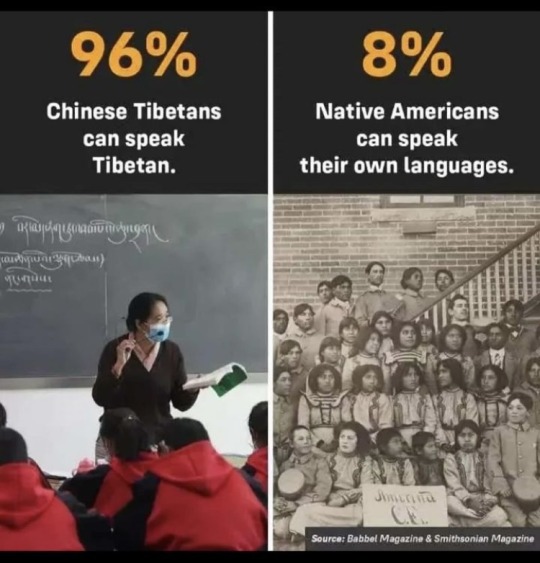

#china#chinese politics#political#political posting#politics#world politics#current events#social justice#human rights#leftist#chinese communist party#leftism#leftisim#leftist politics#left wing#left wing politics#socialism#socialist#socialist politics#communist#communism#marxism#marxist leninist#marxist#marxism leninism#maoism#media bias#indigenous#rights#indigenous rights
5 notes
·
View notes
Text
The Power of Accurate Representation: Advocating for Indigenous People in the Media
Shaina Tranquilino
October 7, 2023

In a world that thrives on media and entertainment, accurate representation is crucial for fostering understanding, breaking stereotypes, and promoting equality. Unfortunately, Indigenous people have historically been misrepresented or underrepresented in the media. However, as society evolves and becomes more inclusive, it is time to turn the spotlight onto their rich cultures, histories, and contemporary issues. In this blog post, we will explore how Indigenous people are currently portrayed in the media and discuss effective strategies to advocate for accurate representation.
1. Understanding the Current Misrepresentation:
Indigenous communities often face harmful stereotypes perpetuated by mainstream media. They are frequently depicted as primitive, exoticized caricatures or reduced to historical figures rather than acknowledging their vibrant existence today. This misrepresentation not only reinforces negative biases but also erases their contributions to society.
2. Amplifying Authentic Voices:
The first step towards accurate representation lies in amplifying authentic Indigenous voices within the media industry. By diversifying decision-making roles and leadership positions in film production companies, newsrooms, and advertising agencies, we can ensure that stories are told from an insider's perspective with cultural sensitivity.
3. Collaborative Storytelling:
Collaboration between Indigenous communities and media professionals is key to portraying accurate narratives. Encouraging partnerships and co-production models allows for shared ownership of stories while respecting cultural protocols and ensuring accuracy.
4. Challenge Stereotypes:
Advocacy begins by challenging stereotypes head-on through public discourse and education initiatives. Engage with social media campaigns calling out harmful portrayals while highlighting positive examples of authentic representation. Grassroots movements like #NotYourMascot challenge appropriation in sports imagery.
5. Support Independent Indigenous Media:
Independent platforms dedicated to showcasing diverse Indigenous voices exist around the world; supporting them financially and sharing their content helps break down barriers imposed by mainstream media gatekeepers.
6. Advocacy Through Education:
Promoting accurate representation requires educating both media professionals and the general public. Encourage media literacy programs that teach critical thinking skills to analyze stereotypes, biases, and the importance of authentic representation.
7. Cultural Competency Training:
Media organizations should prioritize cultural competency training for their employees to foster a deeper understanding of Indigenous cultures, histories, and contemporary issues. This will lead to more informed storytelling and prevent harmful misrepresentations.
The media has an immense influence on society's perception of Indigenous people. By advocating for accurate representation through collaboration, challenging stereotypes, supporting independent platforms, promoting education, and implementing cultural competency training, we can ensure that Indigenous communities are portrayed in a respectful and authentic manner. It is our collective responsibility to advocate for accurate representation in the media to create a world where diverse voices are celebrated and embraced.
#Indigenous voices matter#accurate representation#media advocacy#indigenous culture#inclusive media#diversity and inclusion#empowering indigenous communities#breaking stereotypes#amplifying indigenous stories#cultural appreciation#decolonize the media
2 notes
·
View notes
Text
something feels deeply fucked up about taylor sheridan making monica in particular the mouthpiece for his weird boomer anti-tech rant
#3x01#yellowstone tv#is it perhaps the way social media and internet connectivity has enabled indigenous communities to communicate more effectively#including about the injustices being done to their people and on their land?#perhaps
0 notes
Text
I can't stop thinking about the news out of Palestine. Israel is sieging al Shifa hospital. Videos of people's limbs being severed off are haunting (graphic video tw). The hospital has ran out of fuel and 39 babies in incubators are fending for their lives by themselves, because Israel has stationed snipers around the hospital and is shooting all medical crew that walks into their sight.
First, the narrative was Israel would never bomb hospitals. Now, the hospitals are Hamas bases. Then, we respect journalists. Now, we have a fucking kill list of journalists because they are Hamas collaborators. First, we are not letting fuel in until the hostages are released. Now, we are not accepting the hostages back because that would stop our ground invasion and let Hamas win. And I could go on about every single lie they're making up. If you look up "Hamas rape" on google, the first link leads to Times of Israel saying Israel has found no forensic evidence of sexual violence, and only one eyewitness testimony out of 3.5k people attending the rave. If you Google "Hamas beheaded babies" the top links say they have no evidence for the claim besides word of mouth from extremist soldiers. Israeli extremists think about the ugliest goriest scene they can make out in their sick heads, tell that to a international journalist and they run away with it like it's gospel.
And children are being killed in the name of these lies. Thousands are being displaced in images that remind me of the pictures of Tantura 75 years ago, with their hands up so the tanks don't shoot them. Amputees are leaving the hospitals in wheelchairs hours after their surgeries because they are being shot at. Elders who survived the Nakba on 48 are having to walk towards Southern Gaza on foot (imagine walking from one end of your city to the other on foot), displaced again. People are cheering for the haunting images of white phosphorus bombs being dropped over Gaza. Gazan workers who were arrested in the West Bank are being thrust back into the bombings wearing numbered labels.
This is not normal. We are seeing the early stages of the settler colonial genocide of an indigenous population. Native leaders who have visited Gaza say its refugee camps look eerily like reservations. We can stop this. For the first time we are able to see wide scale accounts from the hands of the people suffering the genocide, and Israel is so scared of it they have cut all communications in Gaza.
This is our litmus test. I think we have never seen more clearly, with Palestine, Armenia, Congo and Sudan how colonialism has made our world a rotten place to live in.
The South African apartheid collapsed due to boycotts. We have to do everything in our power to stop Israel's hegemony. Even talking to a group of friends about Palestine changes the status quo. There's no world where we can live peacefully if Israel accomplishes their goals.
Keep yourself updated and share Palestinian voices. Muna El-Kurd said every tweet is like a treasure to them, because their voices are repressed on social media and even on this very app. Make it your action item to share something about the Palestinian plight everyday. Here are some resources:
Al Jazeera, Anadolu Agency, Mondoweiss
Boycott Divest Sanction Movement
Palestinian Youth Movement is organizing protests and direct action against weapons factories across the US
Mohammed El-Kurd (twitter / instagram)
Muhammad Shehada (twitter)
Motaz Azaiza (instagram) - reporting directly from Gaza.
Hind Khudary - reporting directly from Gaza. Her husband and daughter moved South to run from the tanks but she stayed behind to record the genocide. The least we can do is not let her calls fall on deaf ears.
You can participate in boycotts wherever you are in the world, through BDS guidelines. Don't be overwhelmed by gigantic boycott lists. BDS explicitly targets only a few brands which have bigger impact. You can stop consuming from as many brands as you want, though, and by all means feel free to give a 1 star review to McDonalds, Papa John, Pizza Hut, Burger King and Starbucks. Right now, they are focusing on boycotting the following:
Carrefour, HP, Puma, Sabra, Sodastream, Ahava cosmetics, Israeli fruits and vegetables
Push for a cultural boycott - pressure your favorite artist to speak out on Palestine and cancel any upcoming performances on occupied territory (Lorde cancelled her gig in Israel because of this. It works.)
If you can, participate in direct action or donate.
Palestine Action works to shut down Israeli weapons factories in the UK and USA, and have successfully shut down one of their firms in London.Some of the activists are going on trial and are calling for mobilizing on court.
Palestinian Youth Movement is organizing direct actions to stop the shipping of wars to Israel. Follow them.
Educate yourself. Read into Palestinian history and the occupation. You can't common sense people out of decades of propaganda. If your arguments crumble when a zionist brings up the "disengagement of Gaza", you have to learn more.
Read Decolonize Palestine. They have 15 minute reads that concisely explain the occupation (and its colonial roots) and debunk popular myths, including pinkwashing.
Read on Palestine. Here's an amazing masterpost.
Verso Book Club is giving out free books on Palestine (I personally downloaded Ten Myths about Israel by Ilan Pappe. If you still believe in the two states solution, this book by an Israeli professor debunks it).
Call your representatives. The Labour Party in the UK had an emergency meeting after several councilors threatened to resign if they didn't condemn Israeli war crimes. Calling to show your complaints works, even more if you live in a country that funds genocide.
FOR PEOPLE IN THE USA: USCPR has developed this toolkit for calls, here's a document that autosends emails to your representatives and here's a toolkit by Ceasefire in Gaza NOW!
FOR PEOPLE IN EUROPE: Here's a toolkit by Voices in Europe for Peace targeting the European Parliament and one specific for almost all countries in Europe, including Germany, Ireland, Poland, Denmark, Sweden, Netherlands, Greece, Norway, Italy, Portugal, Spain, Finland, Austria, Belgium Romania and Ukraine
FOR PEOPLE IN THE UK: Friends of Al-Aqsa UK and Palestine Solidarity UK have made toolkits for calls and emails
FOR PEOPLE IN AUSTRALIA: Here's a toolkit by Stand With Palestine
FOR PEOPLE IN CANADA: Here's a toolkit by Indepent Jewish Voices for Canada
Join a protest. Here's a constantly updating list of protests:
Global calendar
Another global calendar (go to the instragram of the organizers to confirm your protest)
USA calendar
Australia calendar
Feel free to add more.
30K notes
·
View notes
Text
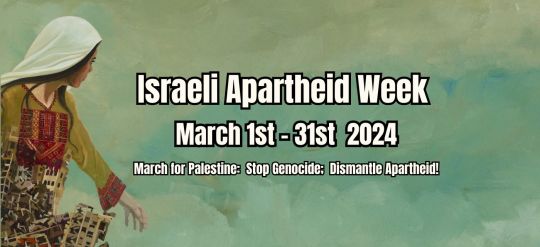
🇵🇸 From BDS:
This year’s Israeli Apartheid Week will be the most important since IAW was launched 20 years ago! With the ongoing Nakba at its height, Israel is carrying out the world’s first ever live-streamed genocide against 2.3 million Palestinians in Gaza while it continues to entrench its 75-year-old settler-colonial apartheid regime against all Indigenous Palestinians. Over the past few months, people around the world have carried out inspiring actions building people power to end state, corporate and institutional complicity in Israel’s #GazaGenocide and contribute to the Palestinian struggle for freedom, justice, and equality. With the failure of the international system, under US and Western hegemony, on full display, we will organize IAW throughout the month of March to bring justice from below. Save the date - March 1st - March 30th; an entire month of action and BDS mobilizations to end complicity in genocide, build grassroots power towards liberation and the dismantling of Israel’s settler-colonial apartheid regime. Let’s make this year’s IAW our most impactful ever!
In anticipation of the upcoming Israeli Apartheid Week, BDS has called for an escalation of our boycott campaigns.
To find out how you can join a specific BDS campaign, or how you can contribute towards IAW, you can use the search function on their website to find a BDS-affiliated organization in your country.
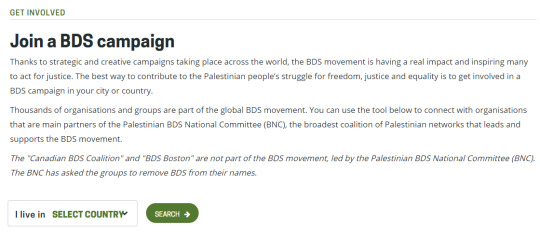
If you and your organization have an event planned for Israeli Apartheid Week (IAW), you can register them with BDS here.
🇵🇸 For individuals unaffiliated with an org, you can still support and participate in IAW by:
Boycotting all products from Israel and from companies profiting off the occupation of Palestine. Here are the official BDS targets. For a more extensive list of products, check in with one of the BDS affiliated organizations in your country (they might tell you, for instance, what processed food items at your local grocery store should be avoided).
Share information about BDS on social media, with friends and family, and with your local community.
For BDS targeted brands, refrain from making or sharing any content that helps that company's outreach and branding. No more memes mentioning the brand, no pictures showing their logo, no more free advertising. Boycotting here isn't just about the loss you as a costumer can inflict on the company by not purchasing their product, it's also about damaging the brand's reputation, and limiting their customer outreach.
I highly encourage you to join a BDS-affiliated org, but if for whatever reason you can't, then these are concrete and actionable steps you can take.
Again, for more information about BDS and Israeli Apartheid Week, you check in with the official BDS website.
#free palestine#palestine#israel#gaza#bds#boycott divest sanction#i'll set this up to be queued throughout feb/mar#and i'll also be sharing more BDS info/campaigns on this blog
10K notes
·
View notes
Text
Follow-up to the UNPFII Recommendations: Towards a study on Media and Indigenous Peoples (UNPFII Side Event)
On the margins of the 23rd session of the UNPFII, the multistakeholder meeting will:
Inform UNPFII members and interested stakeholders of the progress of the study
Present the results of the desk and literature research conducted around the world in the fields of communication, journalism, media, and Indigenous studies to assess media development, pluralism and diversity in the media and their impact on Indigenous People.
Discuss strategies to address the identified gaps, challenges, and limitations in the conduct of the study.
Present the draft methodology and survey instrument for data collection at the global level
Facilitate dialogue among media organizations, including Indigenous Peoples media, and media experts to develop strategic recommendations to be included in the study.
Watch the "Towards a study on Media and Indigenous Peoples"(UNPFII Side Event)

#indigenous#tribal groups#aboriginal#indigenous youth#indigenous rights#medi#media professionals#indigenous community media#multistakeholder#unfpii23#side-events#united nations headquarters
0 notes
Text
The director of the New York Office of the High Commissioner for Human Rights of the UN (UN OHCHR), Craig Mokhiber, has resigned in a letter dated 28 October 2023
the resignation letter can be found embedded in this tweet by Rami Atari (@.Raminho) dated 31 October 2023.
The letters are here:
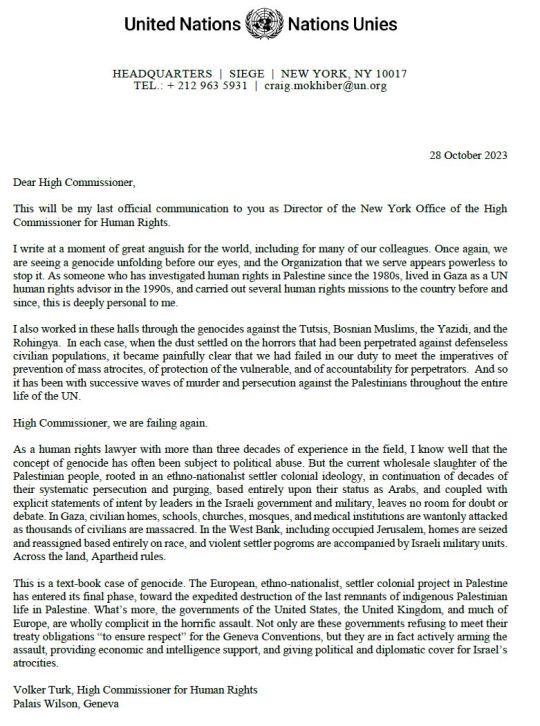
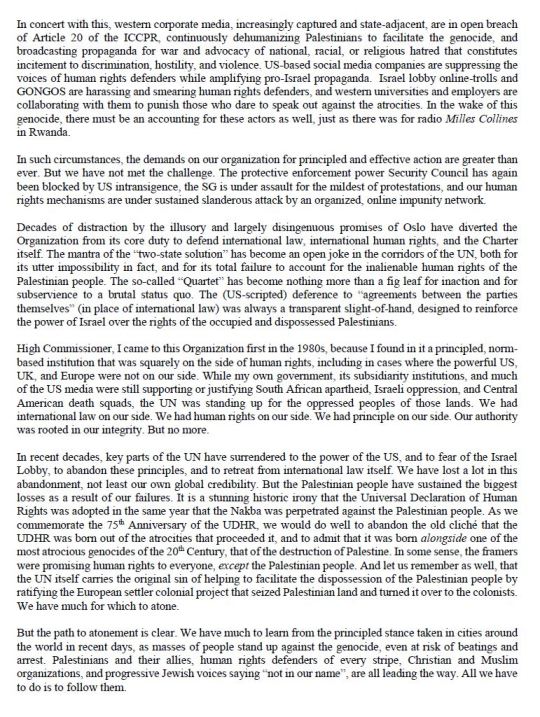
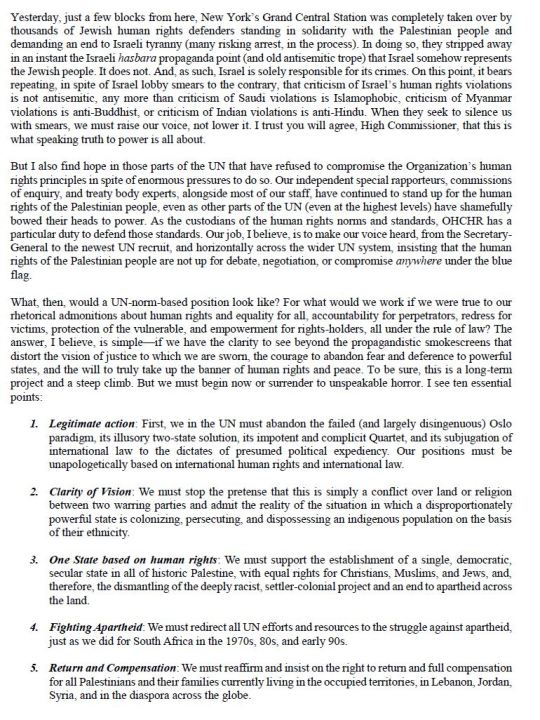
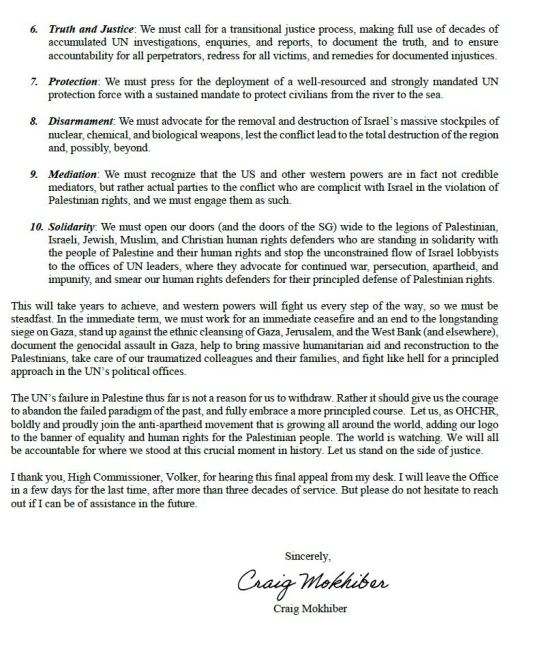
Transcription:
United Nations | Nations Unies
HEADQUARTERS I SIEGE I NEW YORK, NY 10017
28 October 2023
Dear High Commissioner,
This will be my last official communication to you as Director of the New York Office of the High Commissioner for Human Rights.
I write at a moment of great anguish for the world, including for many of our colleagues. Once again, we are seeing a genocide unfolding before our eyes, and the Organization that we serve appears powerless to stop it. As someone who has investigated human rights in Palestine since the 1980s, lived in Gaza as a UN human rights advisor in the 1990s, and carried out several human rights missions to the country before and since, this is deeply personal to me.
I also worked in these halls through the genocides against the Tutsis, Bosnian Muslims, the Yazidi, and the Rohingya. In each case, when the dust settled on the horrors that had been perpetrated against defenseless civilian populations, it became painfully clear that we had failed in our duty to meet the imperatives of prevention of mass atrocites, of protection of the vulnerable, and of accountability for perpetrators. And so it has been with successive waves of murder and persecution against the Palestinians throughout the entire life of the UN.
High Commissioner, we are failing again.
As a human rights lawyer with more than three decades of experience in the field, I know well that the concept of genocide has often been subject to political abuse. But the current wholesale slaughter of the Palestinian people, rooted in an ethno-nationalist settler colonial ideology, in continuation of decades of their systematic persecution and purging, based entirely upon their status as Arabs, and coupled with explicit statements of intent by leaders in the Israeli government and military, leaves no room for doubt or debate. In Gaza, civilian homes, schools, churches, mosques, and medical institutions are wantonly attacked as thousands of civilians are massacred. In the West Bank, including occupied Jerusalem, homes are seized and reassigned based entirely on race, and violent settler pogroms are accompanied by Israeli military units. Across the land, Apartheid rules.
This is a text-book case of genocide. The European, ethno-nationalist, settler colonial project in Palestine has entered its final phase, toward the expedited destruction of the last remnants of indigenous Palestinian life in Palestine. What's more, the governments of the United States, the United Kingdom, and much of Europe, are wholly complicit in the horrific assault. Not only are these governments refusing to meet their treaty obligations "to ensure respect" for the Geneva Conventions, but they are in fact actively arming the assault, providing economic and intelligence support, and giving political and diplomatic cover for Israel's atrocities.
Volker Turk, High Commissioner for Human Rights Palais Wilson, Geneva
In concert with this, western corporate media, increasingly captured and state-adjacent, are in open breach of Article 20 of the ICCPR, continuously dehumanizing Palestinians to facilitate the genocide, and broadcasting propaganda for war and advocacy of national, racial, or religious hatred that constitutes incitement to discrimination, hostility, and violence. US-based social media companies are suppressing the voices of human rights defenders while amplifying pro-Israel propaganda. Israel lobby online-trolls and GONGOS are harassing and smearing human rights defenders, and western universities and employers are collaborating with them to punish those who dare to speak out against the atrocities. In the wake of this genocide, there must be an accounting for these actors as well, just as there was for radio Mules Collins in Rwanda.
In such circumstances, the demands on our organization for principled and effective action are greater than ever. But we phave not met the challenge. The protective enforcement power Security Council has again been blocked by US intransigence, the SG [UN Secretary General] is under assault for the mildest of protestations, and our human rights mechanisms are under sustained slanderous attack by an organized, online impunity network.
Decades of distraction by the illusory and largely disingenuous promises of Oslo have diverted the Organization from its core duty to defend international law, international human rights, and the Charter itself. The mantra of the "two-state solution" has become an open joke in the corridors of the UN, both for its utter impossibility in fact, and for its total failure to account for the inalienable human rights of the Palestinian people. The so-called "Quartet" has become nothing more than a fig leaf for inaction and for subservience to a brutal status quo. The (US-scripted) deference to "agreements between the parties themselves" (in place of international law) was always a transparent slight-of-hand, designed to reinforce the power of Israel over the rights of the occupied and dispossessed Palestinians.
High Commissioner, I came to this Organization first in the 1980s, because I found in it a principled, norm-based institution that was squarely on the side of human rights, including in cases where the powerful US, UK, and Europe were not on our side. While my own government, its subsidiarity institutions, and much of the US media were still supporting or justifying South African apartheid, Israeli oppression, and Central American death squads, the UN was standing up for the oppressed peoples of those lands. We had international law on our side. We had human rights on our side. We had principle on our side. Our authority was rooted in our integrity. But no more.
In recent decades, key parts of the UN have surrendered to the power of the US, and to fear of the Israel Lobby, to abandon these principles, and to retreat from international law itself. We have lost a lot in this abandonment, not least our own global credibility. But the Palestinian people have sustained the biggest losses as a result of our failures. It is a stunning historic irony that the Universal Declaration of Human Rights was adopted in the same year that the Nakba was perpetrated against the Palestinian people. As we commemorate the 75th Anniversary of the UDHR, we would do well to abandon the old cliché that the UDHR was born out of the atrocities that proceeded it, and to admit that it was born alongside one of the most atrocious genocides of the 20th Century, that of the destruction of Palestine. In some sense, the framers were promising human rights to everyone, except the Palestinian people. And let us remember as well, that the UN itself carries the original sin of helping to facilitate the dispossession of the Palestinian people by ratifying the European settler colonial project that seized Palestinian land and turned it over to the colonists. We have much for which to atone.
But the path to atonement is clear. We have much to learn from the principled stance taken in cities around the world in recent days, as masses of people stand up against the genocide, even at risk of beatings and arrest. Palestinians and their allies, human rights defenders of every stripe, Christian and Muslim organizations, and progressive Jewish voices saying "not in our name", are all leading the way. All we have to do is to follow them.
Yesterday, just a few blocks from here, New York's Grand Central Station was completely taken over by thousands of Jewish human rights defenders standing in solidarity with the Palestinian people and demanding an end to Israeli tyranny (many risking arrest, in the process). In doing so, they stripped away in an instant the Israeli hasbara propaganda point (and old antisemitic trope) that Israel somehow represents the Jewish people. It does not. And, as such, Israel is solely responsible for its crimes. On this point, it bears repeating, in spite of Israel lobby smears to the contrary, that criticism of Israel's human rights violations is not antisemitic, any more than criticism of Saudi violations is Islamophobic, criticism of Myanmar violations is anti-Buddhist, or criticism of Indian violations is anti-Hindu. When they seek to silence us with smears, we must raise our voice, not lower it. I trust you will agree, High Commissioner, that this is what speaking truth to power is all about.
But I also find hope in those parts of the UN that have refused to compromise the Organization's human rights principles in spite of enormous pressures to do so. Our independent special rapporteurs, commissions of enquiry, and treaty body experts, alongside most of our staff, have continued to stand up for the human rights of the Palestinian people, even as other parts of the UN (even at the highest levels) have shamefully bowed their heads to power. As the custodians of the human rights norms and standards, OHCHR. has a particular duty to defend those standards. Our job, I believe, is to make our voice heard, from the Secretary-General to the newest UN recruit, and horizontally across the wider UN system, incisting that the human rights of the Palestinian people are not up for debate, negotiation, or compromise anywhere under the blue flag.
What, then, would a UN-norm-based position look like? For what would we work if we were true to our rhetorical admonitions about human rights and equality for all, accountability for perpetrators, redress for victims, protection of the vulnerable, and empowerment for rights-holders, all under the rule of law? The answer, I believe, is simple—if we have the clarity to see beyond the propagandistic smokescreens that distort the vision of justice to which we are sworn, the courage to abandon fear and deference to powerful states, and the will to truly take up the banner of human rights and peace. To be sure, this is a long-term project and a steep climb. But we must begin now or surrender to unspeakable horror. I see ten essential points:
Legitimate action: First, we in the UN must abandon the failed (and largely disingenuous) Oslo paradigm, its illusory two-state solution, its impotent and complicit Quartet, and its subjugation of international law to the dictates of presumed political expediency. Our positions must be unapologetically based on international human rights and international law.
Clarity of Vision: We must stop the pretense that this is simply a conflict over land or religion between two warring parties and admit the reality of the situation in which a disproportionately powerful state is colonizing, persecuting, and dispossessing an indigenous population on the basis of their ethnicity.
One State based on human rights: We must support the establishment of a single, democratic, secular state in all of historic Palestine, with equal rights for Christians, Muslims, and Jews, and, therefore, the dicmantling of the deeply racist, settler-colonial project and an end to apartheid across the land.
Fighting Apartheid: We must redirect all UN efforts and resources to the struggle against apartheid, just as we did for South Africa in the 1970s, 80s, and early 90s.
Return and Compensation: We must reaffirm and insist on the right to return and full compensation for all Palestinians and their families currently living in the occupied territories, in Lebanon, Jordan, Syria, and in the diaspora across the globe.
Truth and Justice: We must call for a transitional justice process, making full use of decades of accumulated UN investigations, enquiries, and reports, to document the truth, and to ensure accountability for all perpetrators, redress for all victims, and remedies for documented injustices.
Protection: We must press for the deployment of a well-resourced and strongly mandated UN protection force with a sustained mandate to protect civilians from the river to the sea.
Disarmament: We must advocate for the removal and destruction of Israel's massive stockpiles of nuclear, chemical, and biological weapons, lest the conflict lead to the total destruction of the region and, possibly, beyond.
Mediation: We must recognize that the US and other western powers are in fact not credible mediators, but rather actual parties to the conflict who are complicit with Israel in the violation of Palestinian rights, and we must engage them as such.
Solidarity: We must open our doors (and the doors of the SG) wide to the legions of Palestinian, Israeli, Jewish, Muslim, and Christian human rights defenders who are standing in solidarity with the people of Palestine and their human rights and stop the unconstrained flow of Israel lobbyists to the offices of UN leaders, where they advocate for continued war, persecution, apartheid, and impunity, and smear our human rights defenders for their principled defense of Palestinian rights.
This will take years to achieve, and western powers will fight us every step of the way, so we must be steadfast. In the immediate term, we must work for an immediate ceasefire and an end to the longstanding siege on Gaza, stand up against the ethnic cleansing of Gaza, Jerusalem, and the West Bank (and elsewhere), document the genocidal assault in Gaza, help to bring massive humanitarian aid and reconstruction to the Palestinians, take care of our traumatized colleagues and their families, and fight like hell for a principled approach in the UN's political offices.
The UN's failure in Palestine thus far is not a reason for us to withdraw. Rather it should give us the courage to abandon the failed paradigm of the past, and fully embrace a more principled course. Let us, as OHCHR, boldly and proudly join the anti-apartheid movement that is growing all around the world, adding our logo to the banner of equality and human rights for the Palestinian people. The world is watching. We will all be accountable for where we stood at this crucial moment in history. Let us stand on the side of justice.
I thank you, High Commissioner, Volker, for hearing this final appeal from my desk. I will leave the Office in a few days for the last time, after more than three decades of service. But please do not hesitate to reach out if I can be of assistance in the future.
Sincerely,
Craig Mokhiber
End of transcription.
Emphasis (bolding) is my own. I have added links, where relevant, to explanations of concepts the former Director refers to.
#Israel#Palestine#October 2023#28 October 2023#United Nations#Described#Long post#I’ll add more links to the things he is talking about later
15K notes
·
View notes
Text
#indigenous#native americans#vital information exchange#vital community#vitalportal#thevitalportal#additional information#vital media#blacklivesmatter#vital politics#blacktwitter#myvitaltv
0 notes
Text
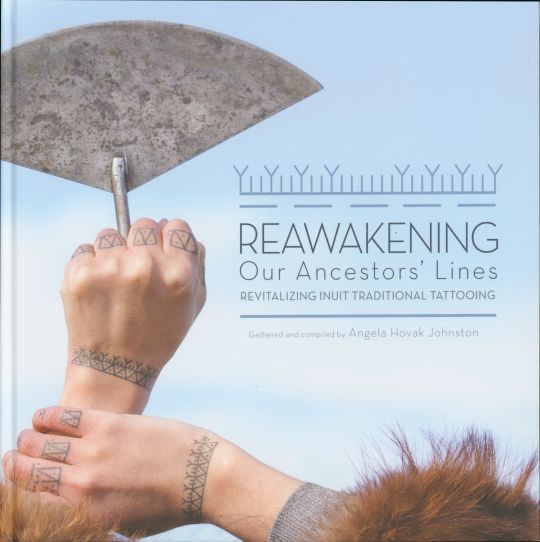
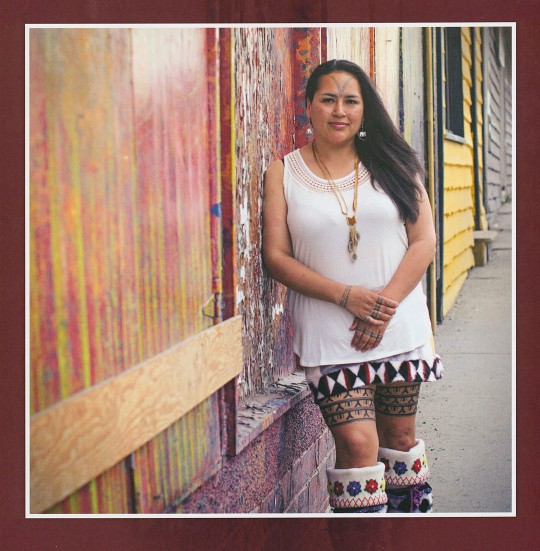
The author, Angela Hovak Johnston.

Johnston and Marjorie Tungwenuk Tahbone, traditional tattoo artist.
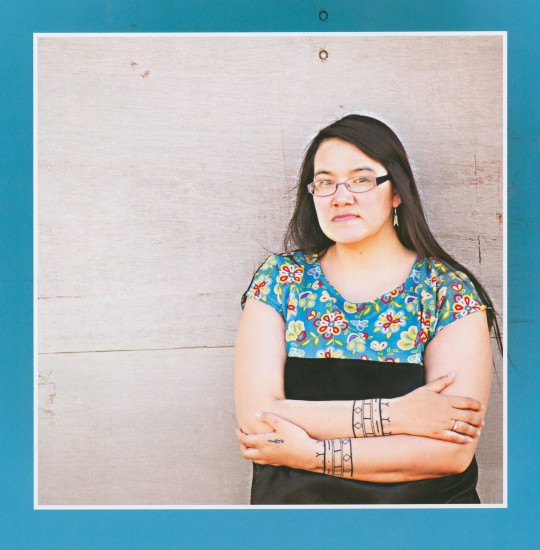
Catherine Niptanatiak: "I designed my own, something that represents me and who I am, something that I would be proud to wear and show off, and something that would make me feel confident and beautiful. . . . I have daughters and I would like to teach them what I know. I would like for them to want to practice our traditions and keep our culture alive."
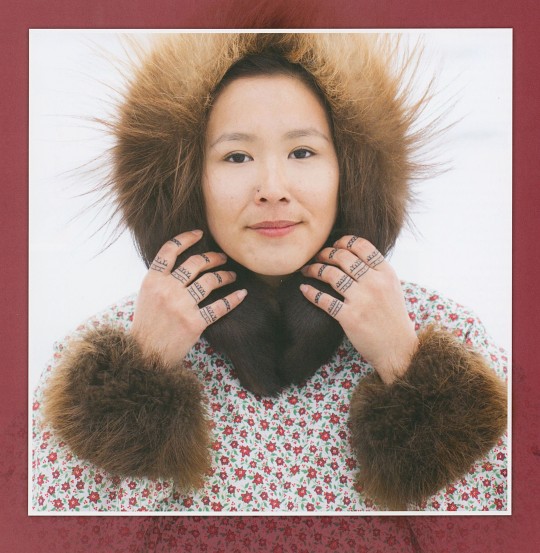
Cecile Nelvana Lyall: "On my hand tattoos, from the top down, the triangles represent the mountains. . . . The Ys are the tools used in seal hunting. . . . The dots are my ancestors. . . . I am so excited to be able to truly call myself and Inuk woman."
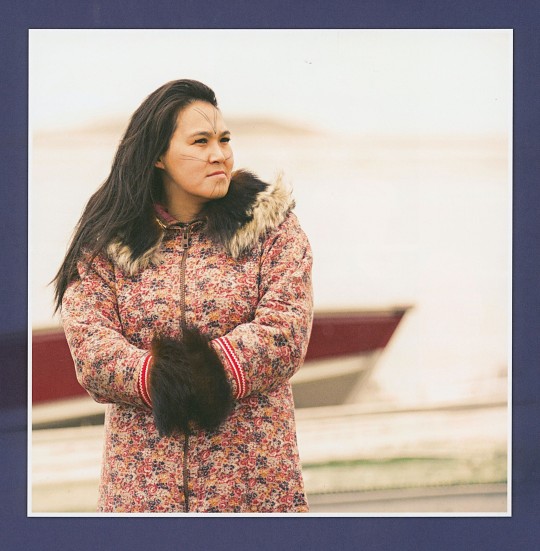
Colleen Nivingalok: "The tattoos on my face represent my family and me. The lines on my chin are my four children -- my two older boys on the outside protecting my daughters. The lines on my cheeks represent the two boys and the two girls on either side. The one on my forehead represents their father and me. Together, we live for our children."
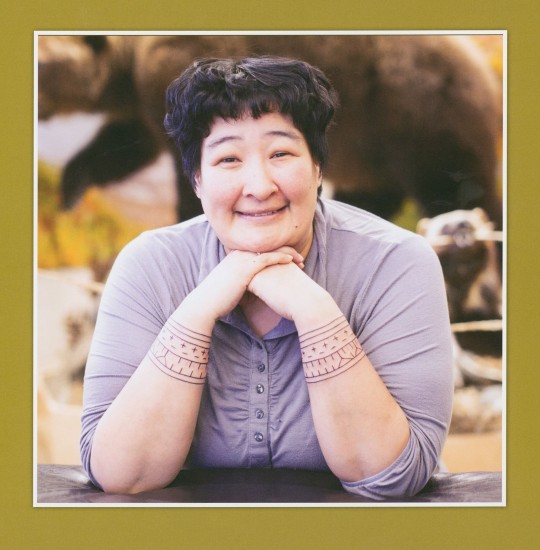
Doreen Ayalikyoak Evyagotailak: "I have thought about getting traditional tattoos since I was a teenager. . . . When I asked the elders if I could have my own meaning for my tattoos, they said it wouldn't matter. My tattoos symbolize my kids."

Mary Angele Takletok: "I always wanted traditional tattoos like the women in the old days. I wanted them on my wrists and my fingers so I could show I'm Inuk."
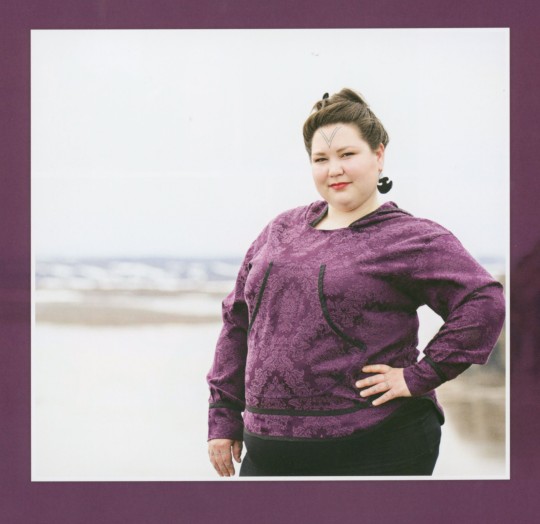
Melissa MacDonald Hinanik: "As a part of celebrating my heritage and revitalizing important traditional customs that form my identity, I believe I have earned my tattoos. I am a beautiful, strong young woman. I am a mother, a wife, a daughter, a friend, and an active community member. I reclaim the traditional customs as mine, I re-own them as a part of who I am."

Star Westwood: "We still have some of our culture, but some things are slowly dying. Having tattoos helps us keep our culture alive. . . . . My tattoos represent my dad and my dad's dad. The ones closest to my wrists represent my sisters."
------------------------------------------------------------------------------
National Tattoo Day
July 17 is National Tattoo Day. To celebrate, we present some images from Reawakening Our Ancestors' Lines: Revitalizing Inuit Traditional Tattooing, compiled by Angela Hovak Johnston, co-founder with Marjorie Tahbone of the Inuit Tattoo Revitalization Project, with photographs by Inuit photographer Cora DeVos, and published in Iqaluit, Nunavut by Inhabit Media Inc. in 2017.
For thousands of years, Inuit have practiced the traditional art of tattooing. Created the ancient way, with bone needles and caribou sinew soaked in seal oil, sod, or soot, these tattoos were an important tradition for many Inuit women, symbols etched on their skin that connected them to their families and communities. But with the rise of missionaries and residential schools in the North, the tradition of tattooing was almost lost. In 2005, when Angela Hovak Johnston heard that the last Inuk woman tattooed in the old way had died, she set out to tattoo herself in tribute to this ancient custom and learn how to tattoo others. What was at first a personal quest became a project to bring the art of traditional tattooing back to Inuit women across Nunavut.
Collected in this book are photos and stories from more than two dozen women who participated in Johnston's project. Together, these women have united to bring to life an ancient tradition, reawakening their ancestors' lines and sharing this knowledge with future generations. Hovak Johnston writes: "Never again will these Inuit traditions be close to extinction, or only a part of history you read about in books. This is my mission."
Reawakening Our Ancestors' Lines forms part of our Indigenous America Literature Collection.
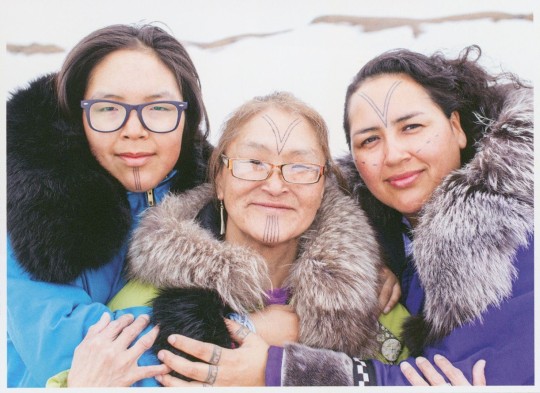
Angela Hovak Johnston (right) with her cousin Janelle Angulalik and her aunt Millie Navalik Angulalik.
View other posts from our Indigenous America Literature Collection.
#National Tattoo Day#tattoos#holidays#Inuit traditional tattoos#Inuit tattoos#Inuit#Inuk#Reawakening Our Ancestors' Lines#Angela Hovak Johnston#Cora DeVos#Cora Kavyaktok#Marjorie Tahbone#Inuit Tattoo Revitalization Project#Inhabit Media Inc.#photographs#Inuit women#Indigenous America Literature Collection#Native American Literature Collection
3K notes
·
View notes
Link
Suppressing independent community voices
#Canada#CRTC#bureaucracy#community media#suprpession#obstruction#indigenous#ethnic#assimiliation#colonialism
0 notes
Text
The Cradle
Israeli police demolish a mosque in the 'unrecognized' Bedouin village of Umm al-Hiran in the Negev (al-Naqab) to make way for an Orthodox Jewish community.
According to a 2015 Israeli High Court of Justice ruling, the Bedouins in the village had been "illegally squatting" on land that belongs to Israel.
Israeli media claims the residents of the Bedouin community demolished their own homes and left, and that the mosque was one of the only structures remaining.
The Times of Israel writes, "The 37 unrecognized villages in the Negev house some 150,000 people, or roughly a third of Israel’s Bedouin population, according to the Council. Israel decided in the 1990s to raze some of the illegally built villages and build authorized communities in their stead."
Fanatic National Security Minister Itamar Ben Gvir praises the demolitions, boasting that he has overseen a 400% rise in demolitions in the Negev since the beginning of 2024.
youtube
youtube
Indigenous Palestinian Bedouins have always lived in the Negev desert. Just like the Colonizers in so called “United States” and “Canada” they came to the lands and decided what is law through genocide, ethnic cleansing, and white supremacist “western values”. To the colonizer it does not matter that the Indigenous peoples have lived on the land for centuries.
As a Palestinian Bedouin close to my heart, whose family was ethnically cleansed from Beersheba, once said “the land is ours, we will go home, you’ll see, you’ll see”
746 notes
·
View notes